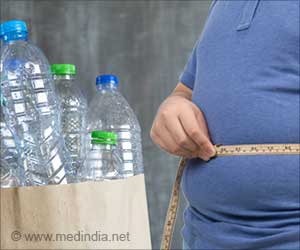
, because it is cheap. At the same time, plastic products contain thousands of different chemicals, which may affect the body’s
.
In this new study, 34 different plastic products were used in the laboratory to see which chemicals they contained. These products are used in daily life like yogurt containers, drinking bottles, and kitchen sponges.
Researchers then found over 50,000 different chemical components in these products and identified 629 chemical substances. Eleven chemicals out of these 629 substances are known to interfere with the metabolism, and they are called metabolism-disrupting chemicals.
Experts for a long time believed that most plastic chemicals would stay in the material, but the recent study shows that plastic products leak a large number of chemicals and enable them to enter the body.
Previous research also suggests that some plastic products contain endocrine-disrupting chemicals that may affect development and fertility. Now it appears that they may affect the metabolism as well.
Chemicals from one-third of the plastic products investigated in the new study under laboratory conditions were found to contribute to fat cell development.
READ RELATED: 7 Health Problems That Can Be the Reason For Unexplainable Bruises on Your Body
These chemical substances reprogramed precursor cells to become fat cells that proliferate and accumulate more fat in the body.
Only some plastic products contained these metabolism-disrupting chemicals. This means that plastic chemicals which are currently unidentified also interfere with the way the body stores fat and contributes to obesity.
Overweight and obesity are the most common causes of deadly diseases such as cardiovascular disease and cancer. They can also increase the susceptibility to various infections, and exaggerate their effects.
Around two billion people in the world are overweight, and approximately 650 million of them fall into the obese category. The problem is growing. The reasons behind obesity are complex, but chemicals present in plastic can be a contributing factor that we have not previously considered.
These chemicals include phthalates and bisphenols, but the new study shows that there are many more substances that trigger these problematic effects.
How to Reduce Plastic Consumption at Home?
- Avoid cellophane-wrapped products and look for other eco-friendly alternatives.
- Store the leftovers with silicone covers instead of plastic ones.
- Upcycle glassware instead of plastic containers.
- Avoid tea bags and use a tea strainer.
- Use reusable bags.
- Avoid disposables and look for other alternatives such as paper, cloth.
Let’s go green and use less plastic to improve air quality.
References:
- Is plastic making us fat? – (https://www.universityofcalifornia.edu/news/are-we-gaining-weight-plastic)
- Chemicals in plastic may contribute to weight gain – (https://www.healtheuropa.eu/chemicals-in-plastic-may-contribute-to-weight-gain/113119/)
Source: Medindia
Source:









